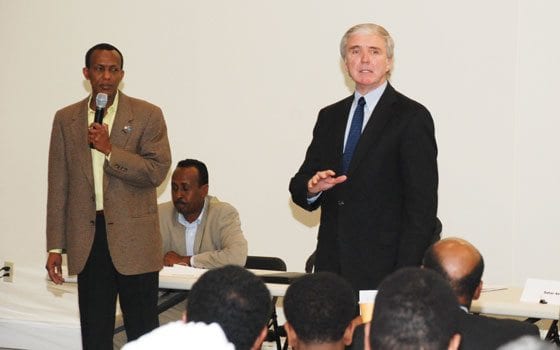
In a meeting last Saturday, Warren Bamford, special agent in charge of the Federal Bureau of Investigation’s Boston field office, and outgoing U.S. Attorney Michael J. Sullivan reassured members of the local Somali Muslim community that the FBI works to protect the civil rights of American citizens.
“Investigating civil rights violations is one of the top priorities of the FBI,” Sullivan said.
The meeting drew about 50 attendees to the Islamic Society of Boston Cultural Center in Roxbury and was a follow-up to one held in November, at which time Bamford outlined a strategy to begin outreach efforts aimed at establishing a partnership between the FBI and Boston’s Somali community.
Initial interest in such a partnership was born out of news last November that Shirwa Ahmed, a Somali-born Muslim and naturalized U.S. citizen living in Minneapolis, had been recruited by a terrorist organization to be a suicide bomber. After being trained in Minneapolis, Ahmed was sent to Somalia to carry out his mission. He blew himself up in a bombing in northern Somalia on Oct. 28.
The story took a local turn last month, when allegations arose in a meeting of the U.S. Senate Committee on Homeland Security that Al Shabaab, an Islamic terrorist group linked to al-Qaida, may be recruiting Boston youth to fight in Somalia. Boston Somalis were angered at the assertions, saying there was no evidence to back them up.
The opportunity for heightened tensions has also increased due to the recent hijacking by Somali pirates of the Maersk Alabama, a cargo ship that had 20 Americans on board, and their kidnapping of Capt. Richard Phillips, a graduate of the Massachusetts Maritime Academy. Phillips was rescued on April 12, when Navy snipers killed three of the pirates holding him hostage on a lifeboat. The fourth, and sole surviving, pirate, Abdhul Wal-i-Musi, was scheduled to appear Tuesday in federal court in Manhattan and expected to be charged with hostage-taking and piracy.
With the help of translators, Bamford stressed that federal law enforcement agencies were not approaching the Somali community because they thought the community was guilty of terrorism. Rather, he said, the FBI and other agencies were looking for help with identifying the individuals responsible for the terrorist acts.
“[We] are very concerned that there are young men traveling from the United States to Somalia to be trained as terrorists,” said Bamford.
Bamford also used this second meeting to ask community members if they felt the FBI was doing a good job of involving the community in the investigation process and keeping them abreast of what was happening.
“I have 80 cases in which I’m trying to prove someone is not a terrorist,” Bamford said. “We appreciate your help and we appreciate working with the community.”
Following a brief slideshow outlining the history of Somalia, Sullivan outlined the FBI’s reasons for attempting to become more involved in the Somali community.
According to Sullivan, who resigned his post as the U.S. Attorney in Massachusetts this past Sunday to take a job in the private sector, federal investigators want to build relationships with the local Somali community so that they are not afraid to deal with state and federal agencies in the future. Sullivan and Bamford also said they were concerned that Somalis in the United States might become the targets of racially motivated crimes because of the actions of a select few.
Attendees reacted positively to the law enforcement representatives’ offerings, often clapping after each finished talking.
“You are starting to do the right thing, by sharing with us,” said Abdirahman A. Yusuf, executive director of the Somali Development Center, based in Jamaica Plain.






